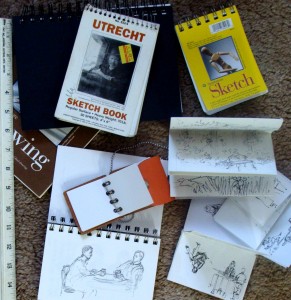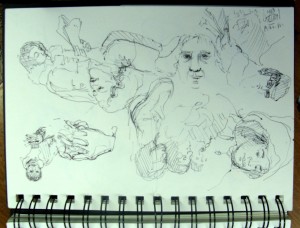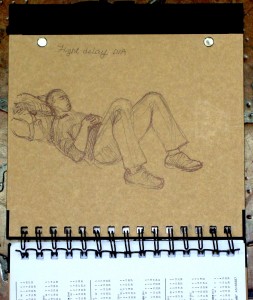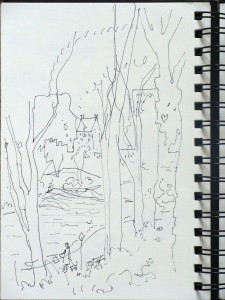www.LillianKennedy.com
Lillian@Rockfire.com
Happy New Year and welcome to the very first installment of the Weekly Art Lesson!
Let’s get 2011 started with some excitement and fun.
You won’t believe how easy it can be to get regular art practice if you just carry and use a sketchbook. It’s cheap and easy to do, and don’t worry – you don’t have to show anybody what you draw. One of the delights of a sketchbook is that it can be as private as you want it to be.

Small sizes make easily portable sketchbooks - get in the habit of having one with you whenever you go out!
Some of you will have had a lot of previous experience with a sketchbook and some of you will be trying this for the first time. You can use this lesson (as well as all the lessons) as motivation by adjusting them to make a challenge that is right for you.
You need almost nothing for supplies. You already have what you need to start skill building and having fun with your art. Any paper will do. Add to that any pencil or pen and you’re ready. Most of us have these things with us when we go out anyhow. The supplies don’t need to come from an art store or to be special in any way.

Sketches done on the NYC subway (11/30/2010). This page shows how, when you are drawing to study something, you can keep turning the paper as you fill it up. Being left handed, it is easiest for me to draw in the upper right hand corner, so I turn the sketchbook to get four such corners per side.
You will find the materials that work best for you only by getting out there and drawing. The important thing is to just do it. Never let the lack of a specific material be an excuse. A sketchbook is nice, but you don’t need one. Draw on the back of a receipt. Napkins have their place in the history of art and design because people have recorded ideas on them so often (however, if you plan ahead, you can have a firmer surface). You can grab a regular piece of paper, fold it, and stick it in your pocket or you can carry a few index cards.
My preference is to use a ball point pen on unlined paper in a small spiral bound sketchbook. Why the spiral binding? If a page is terrible (I don’t decide this at the moment of drawing), it can be torn out and tossed without leaving any indication that it ever existed. If the page turns out great, you can tear it out, trim the edges, and frame it.
Why the pen? I want to be able to write as well as draw, and I don’t want to erase because then I would start “fixing” things and my sketchbook isn’t the place for perfection – it’s the place to explore pictorial ideas, study things, bond with nature through drawing, and

While delayed at the airport and writing in this notebook, I looked up and saw this guy a few feet from me. Knowing that he would willingly hold the pose, I seized the moment and didn't mind the wait to board. L. Kennedy pen drawing
prevent boredom if I’m stuck somewhere (there is always something to draw). If I make too much of a mess of things, I just begin on another page.
How to get started with this drawing habit Have fun with your sketchbook; if you don’t make it fun, you probably won’t stick with it. Draw what interests you. Get curious about how it looks and how to make marks on a piece of paper express what you are seeing. Don’t judge what you do –you can try to make it “good”, but don’t judge whether or not it is while you are working on it. Look and respond to what you are looking at by moving your pen on the paper.
You will learn so many things through this practice.

After photographing this Central Park view (11/30/10), I stood on 59th St. and quickly sketched the composition that interested me. The composition couldn't be shown in my camera viewfinder, but this reminds me of the inspiration and a painting could result from a combination of the sketch, memory, and photos.
There will be many lessons in the future about different aspects of working with a sketchbook. This week’s lesson focuses on getting started. The “assignment” is to start drawing in your sketchbook.
Can you make a New Year’s goal to keep a sketchbook and to draw in it once a week? It doesn’t have to take much time out of a busy schedule. You can draw while watching the news. You can draw in the strangest places and at the oddest times. You can also set aside time to do this just because it might make you a happier and more fulfilled person!
To be part of the conversation, please leave a comment by clicking on Comments below.

I applaud this new addition of yours! …what a wonderful idea! I wish you much success…you continue to amaze me…
I have a question for you: Do you find that people peek over your shoulder to see what you are working on? I imagine some people even ASK to see what you are working on once they realize that you are drawing. So, I’m curious how you handle that? Here’s hoping for words of wisdom in a great one-liner (or two) that one could use to satisfy an onlooker’s curiosity without being rude to the onlooker. Thanks!
Margaret,
What great questions!
I find that if I work low to the ground and in a small sketchbook (while radiating concentration) people rarely seem to notice me. If I stand at an easel, I am “public” and people seem to almost feel obliged to comment.
I’ve done many things in response to the attention that doing art in public can create. I always am kind and polite, but I don’t establish eye contact or take my attention away from my work anymore. By pleasantly saying “thanks!” (in answer to “that’s beautiful” or a similar comment) but not looking up and at the person, I usually end it.
If someone says, “Can I take a look at what you’re doing?”, I say “Of course, go ahead.” BUT I don’t move to show them or turn to see who it is or add extras, such as “This is watercolor with pen. Do you draw or paint?”
Perhaps from now on, I’ll hand people a card about this site if they try to engage me, but, generally, I find that the distraction can stop the concentrated creative process and so I only engage them if I need a break.
You’ve given me a great idea for a post and I will write out all my ideas in the future.
Great to see you New Years Eve! Your new site is very nice! I am sending this to a friend who just recently started painting again after 25 yrs.
Here’s a question… what is “watercolor with a pen”?
Cheers,
Vicky
Hi Vicky,
Thanks for passing on the info about this site; I hope to meet your friend here!
When I describe something as “Watercolor and pen”, I mean that it is a pen drawing that has had watercolor added to it. The watercolor is applied with a brush, not the pen. Lillian
Do you date your sketches, even if they are on napkins, receipts, etc. – on the run?
A visual diary seems like a great way to avoid the haunting memories of our own written words (which prevents some of us from keeping those oft’ recommended journals).
Pingback: Emergency Art Kit – Just Add Water (Online art lesson #31) | weeklyartlesson.com